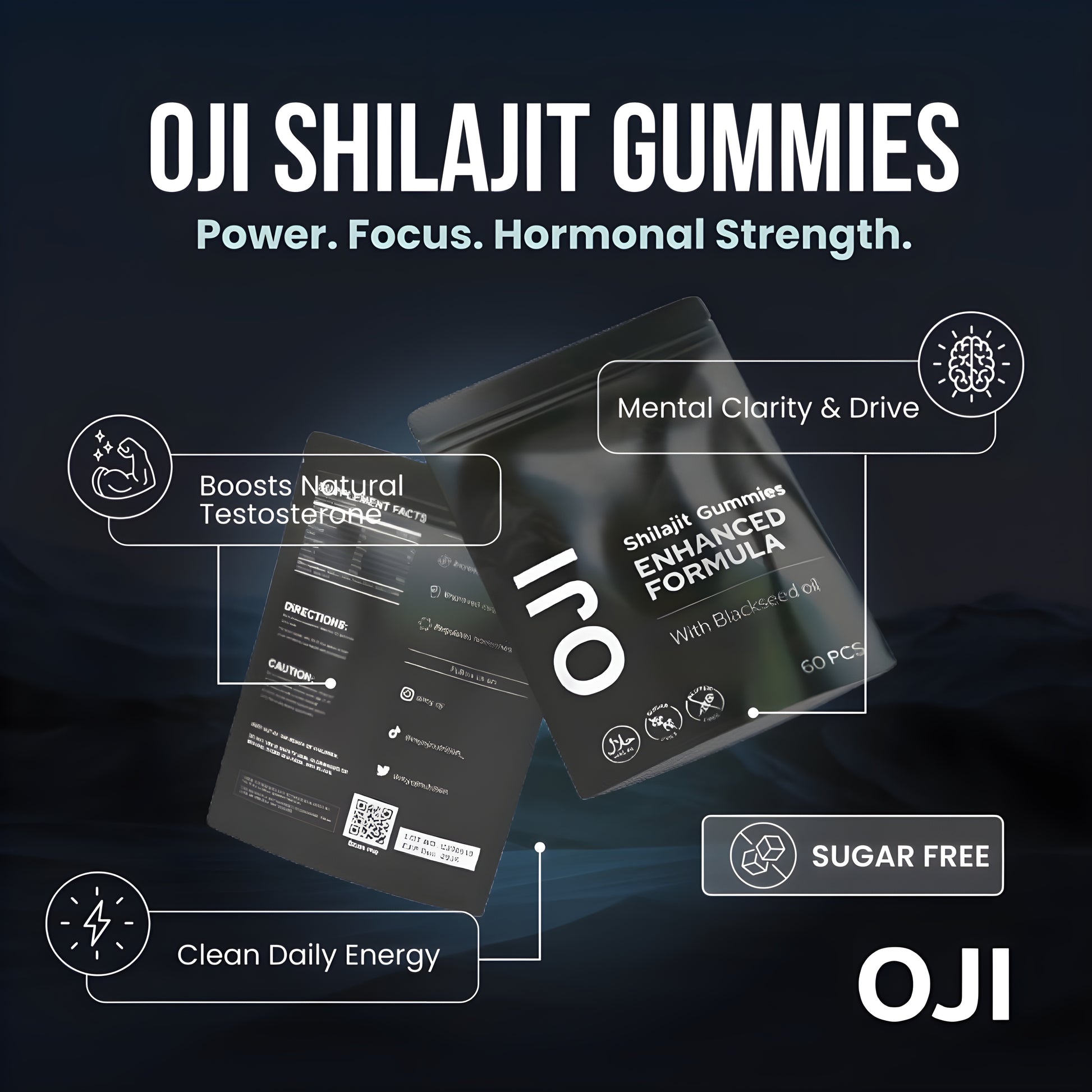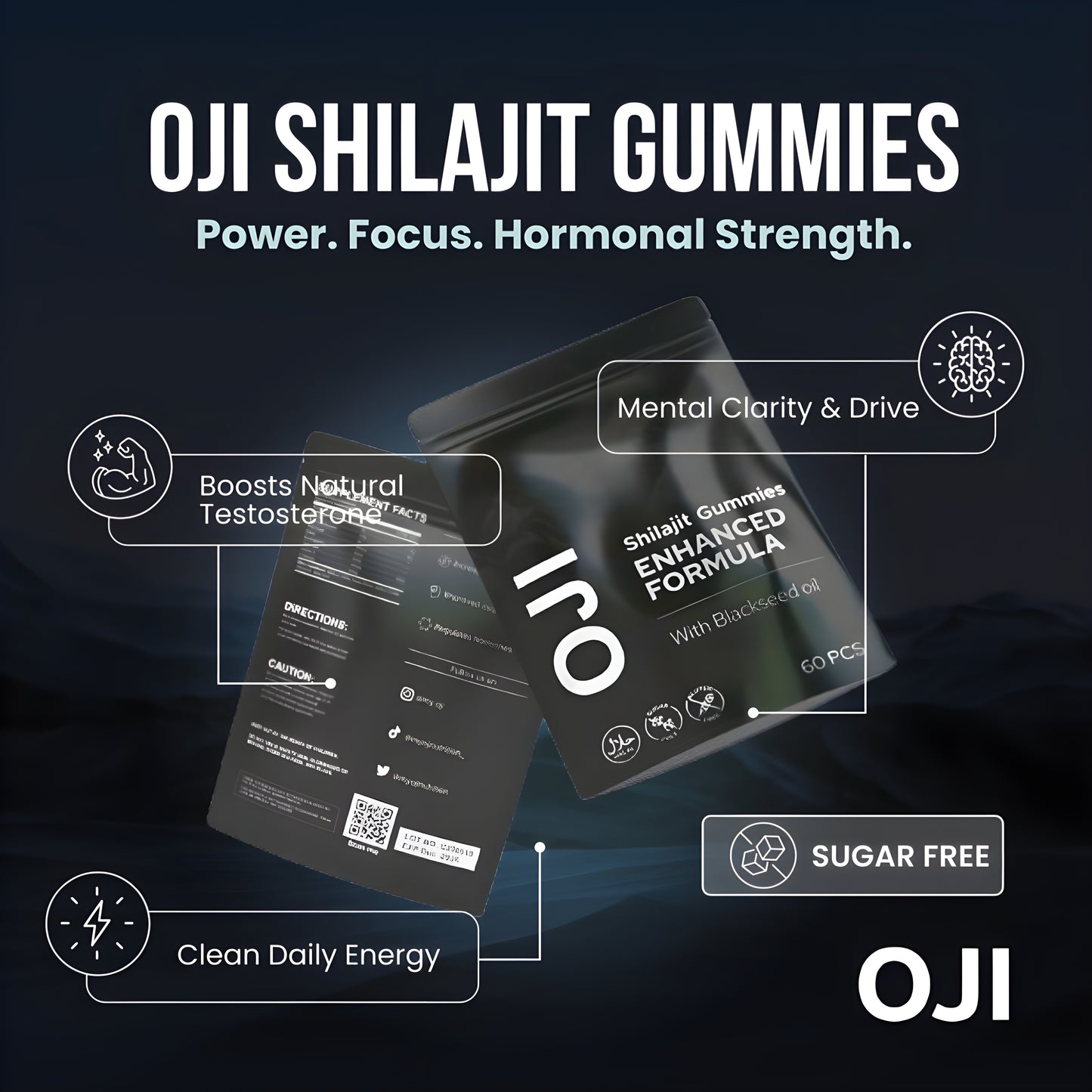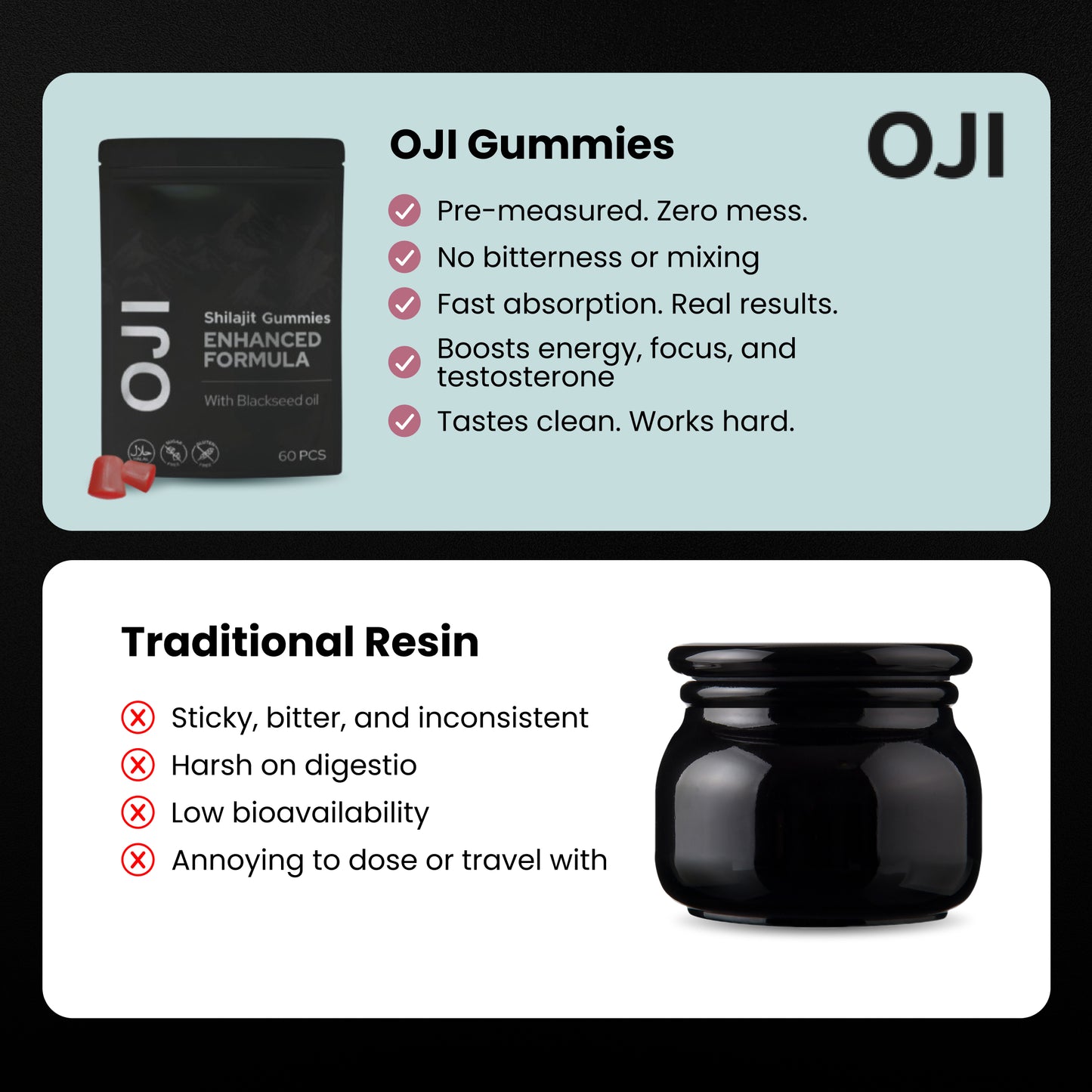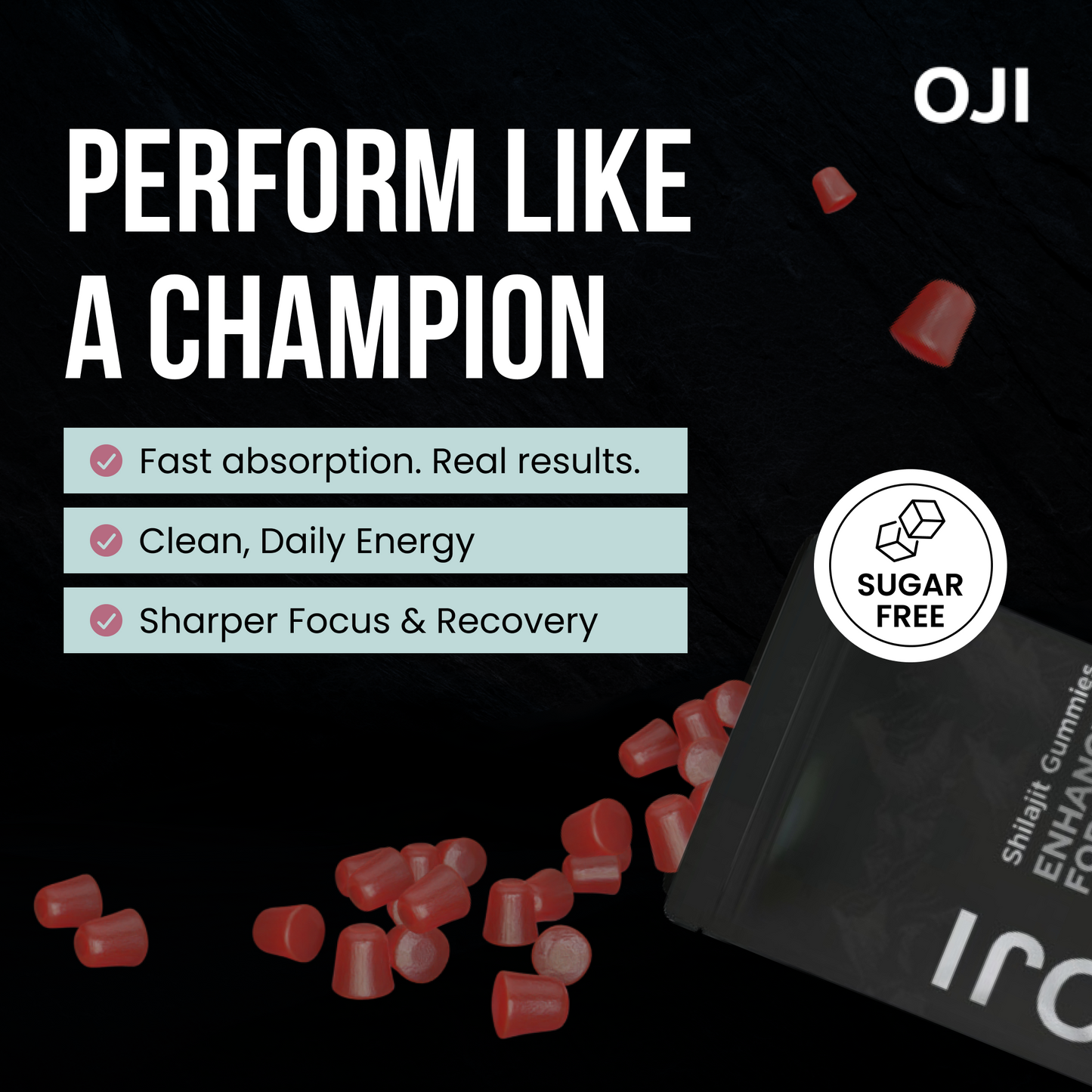Tuning into your body is the first, and most important, step toward finding natural hormonal balance. It's about learning to read the quiet signals—that nagging fatigue, the unpredictable moods—and turning that awareness into real action. This guide provides actionable steps to help you heal and reclaim your energy from the inside out.
What Your Body Is Trying to Tell You
Hormonal balance dictates your energy, mood, and how you feel every single day. Picture your hormones as a finely tuned orchestra. When every instrument plays in harmony, the result is beautiful. But if one is out of tune, the whole performance suffers.
This is a story many of us in the UK are starting to understand more deeply. As we lean more into natural wellness, we're also confronting some old truths about medicine. For too long, women's health was a footnote in research, with some studies showing that only about a third of participants were female. That gap has created a powerful drive for us to understand our own bodies better and seek out natural ways to feel good. If you're keen to dive deeper, you can explore the latest findings on hormonal wellness trends.
The Main Players in Your Hormonal Health
Getting a handle on your hormones means getting to know the key players. While the system is complex, a few big names have a huge say in how you feel from one day to the next.
- Cortisol: Known as the "stress hormone," cortisol is your body's built-in alarm system. The problem is, modern life has the alarm ringing constantly. When cortisol stays high, it can lead to burnout, stubborn belly fat, and terrible sleep.
- Oestrogen: As a primary female sex hormone, oestrogen is a major conductor of your menstrual cycle, mood, and even bone density. When it's out of sync, you might experience everything from PMS and bloating to intense mood swings.
- Progesterone: This hormone is oestrogen's balancing partner, helping to regulate your cycle and keep you feeling calm. When progesterone is low, it's common to feel anxious, sleep poorly, or have irregular periods.
- Thyroid Hormones: Think of these as the thermostat for your body's metabolism. If your thyroid is sluggish or overactive, it can cause unexplained weight changes, brain fog, and a feeling of being constantly drained.
Actionable Step: Learn to Read the Signs
Your body is always sending signals. The key is learning its language. Those little issues you've been putting up with are vital clues.
So many of us write off symptoms like exhaustion or irritability as just a side effect of a busy life. But that feeling of waking up tired, snapping for no reason, or battling weight that won't shift is often your endocrine system crying out for a bit of support.
Start a symptom journal today. Keep an eye out for these common signals and note when they occur:
- Deep fatigue that a full night's sleep just doesn't seem to fix.
- Moods that swing wildly, or a constant feeling of anxiety or irritation.
- Weight that stubbornly clings on, especially around your middle.
- Trouble falling asleep at night or waking up frequently.
- Skin issues out of nowhere, like adult acne or sudden dryness.
Once you start connecting these symptoms to their hormonal roots, you shift from feeling powerless to feeling empowered. This understanding is the 'why' behind all the natural strategies we're about to explore. It's what makes them stick.
Eating for Natural Hormonal Harmony
What you put on your plate is hands down one of the most powerful tools you have for achieving hormonal balance naturally. This isn't about jumping on a restrictive diet; it's about mindfully choosing foods that give your body the raw materials it needs to create and regulate its complex system of chemical messengers.
Think of food as information. Every bite tells your hormones how to behave.
The absolute foundation of hormone production starts with healthy fats. Hormones like oestrogen and progesterone are literally built from cholesterol, so getting enough quality fat isn't just a good idea—it's completely non-negotiable. Without it, your body simply doesn't have the building blocks to do its job.
Actionable Step: Build Your Hormone-Supportive Plate
Crafting a meal that supports your endocrine system is far easier than it sounds. The key is balance and inclusion, not deprivation. Focus on piling on more of the good stuff.
A simple strategy to implement immediately is making sure every meal has a solid source of protein, healthy fat, and fibre-rich carbohydrates. A perfect example? Lunch could be grilled salmon (packed with protein and omega-3 fats), a big mixed green salad drizzled with olive oil (fibre and more healthy fats), and a side of quinoa (a fantastic complex carb). It ticks all the boxes.
The infographic below really brings to life the common signs that your hormones might be crying out for this kind of nutritional support.
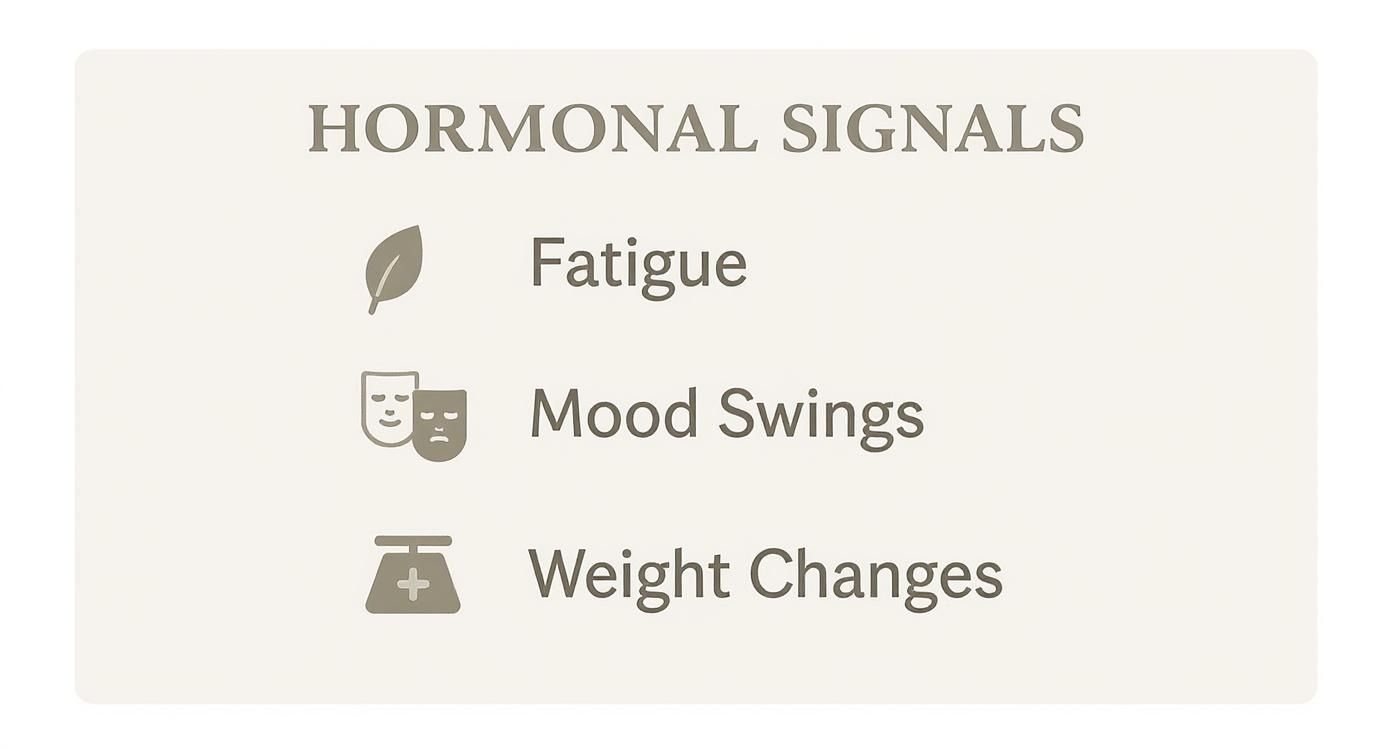
Things like persistent fatigue, mood swings, and stubborn weight changes are often the first signals your body sends when it's not getting what it needs for stable hormonal function.
Actionable Step: Add Key Nutrients to Your Shopping List
Certain foods are absolute superstars when it comes to hormonal health. Weaving them into your regular meals can make a real, noticeable difference in how you feel from one day to the next.
Let's look at a few powerhouse food groups that can get you started on the right track.
Hormone-Supportive Foods and Their Benefits
| Food Group | Hormonal Benefit | Examples & How to Include |
|---|---|---|
| Healthy Fats | Provides the essential building blocks for producing steroid hormones like oestrogen, progesterone, and testosterone. Also helps reduce inflammation. | Add avocado to toast, eat a handful of walnuts, have salmon for dinner, or drizzle extra virgin olive oil over your salad. |
| Cruciferous Veggies | Contains indole-3-carbinol, a compound that supports the liver in metabolising hormones (especially oestrogen) efficiently. | Roast a big tray of broccoli, cauliflower, kale, and Brussels sprouts at the start of the week to easily add to any meal. |
| High-Fibre Foods | Binds to excess hormones in the digestive tract, ensuring they are properly eliminated from the body and don't get reabsorbed. | Add a tablespoon of ground flaxseed or chia seeds to your morning smoothie or porridge. Lentils, beans, and whole grains are also fantastic. |
| Quality Protein | Crucial for blood sugar balance, which directly impacts insulin and cortisol levels. Also provides amino acids needed for hormone production. | Include sources like organic chicken, wild-caught fish, grass-fed beef, eggs, or plant-based options like tofu and lentils in every meal. |
Incorporating these foods consistently is what makes the real difference.
More Hormone-Balancing Powerhouses
-
Magnesium and B Vitamins: These micronutrients are workhorses, involved in hundreds of bodily processes, including stress management and hormone regulation. Magnesium, found in dark chocolate, almonds, and leafy greens, can be brilliant for calming the nervous system and easing PMS. For a deeper dive, you can learn more about the best vitamins for hormone balance and their specific roles.
-
Fibre for Detoxification: It's worth saying again: fibre is absolutely crucial. It helps your body clear out "used" hormones, particularly oestrogen, so they don't hang around causing trouble. That simple tablespoon of ground flaxseed is a great place to start.
Remember, consistency trumps perfection every single time. You don't need to overhaul your entire diet overnight. Start small. Just add one new hormone-supportive habit, like eating a serving of leafy greens with dinner, and build from there.
By focusing on these practical food choices, you're giving your body the essential tools it needs to find its own natural rhythm. This approach isn't a quick fix, but a sustainable way of eating that nourishes your entire system from the inside out, paving the way for lasting hormonal harmony.
Mastering The Cortisol Connection
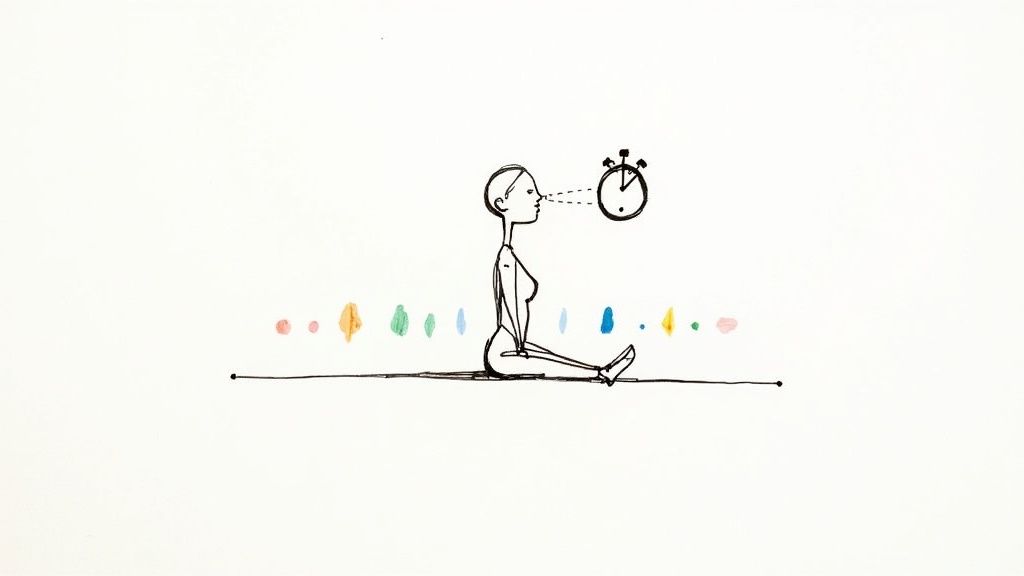
Constant stress is easily one of the biggest wrecking balls for hormonal harmony. What happens is that it keeps cortisol, your main stress hormone, stuck on high alert. Instead of getting that helpful burst of energy when you need it, you get a slow, relentless drip that messes with your sleep, mood, and even your reproductive hormones.
Getting a handle on this is non-negotiable if you’re trying to find hormonal balance naturally. And let’s be realistic—it’s not about getting rid of stress completely. That’s impossible. It’s about building up your resilience and carving out intentional moments of calm in your day-to-day life. This means going beyond someone just telling you to "relax" and actually adopting practical techniques you can use anywhere, anytime.
For so many women in the UK, this pressure is made worse by a silent health struggle. Recent data actually shows that over one in three women between 40 and 60 are secretly dealing with severe hormonal symptoms that impact their work and home lives. It's a stark reminder of how badly we need more awareness and accessible, natural strategies.
Actionable Step: Use Breathwork For Instant Calm
One of the fastest ways to turn down the cortisol dial is by consciously breathing. When you're feeling that wave of overwhelm at your desk or you're stuck in traffic, use the "box breathing" technique.
- Inhale slowly through your nose for a count of four.
- Hold your breath at the top for a count of four.
- Exhale slowly through your mouth, again for a count of four.
- Hold at the bottom for a count of four before starting again.
Just two or three minutes of this can hit the reset button on your nervous system. It sends a clear signal to your body that you’re safe and it’s okay to switch off that fight-or-flight mode.
The goal isn't to find some magical stress-free existence. It's about building a toolkit of small, manageable actions that, when you practise them consistently, create a profound shift in your body's hormonal response to daily pressures.
Doing this regularly helps lower your baseline cortisol levels over time, making you less reactive when stressors inevitably pop up.
Actionable Step: Schedule Downtime Like It’s Your Job
In our go-go-go culture, downtime is always the first thing to get axed from the schedule. But here’s the thing: scheduling moments of genuine rest is just as crucial as any other appointment in your calendar. I'm not talking about mindlessly scrolling on your phone; I mean truly disconnecting.
- Plan a "Tech-Free" Hour: Set aside one hour every evening where all screens are off. Use this time to read a book, listen to music, or just chat with a loved one.
- Embrace Mindful Moments: Even five minutes can make a world of difference. Try a guided meditation app before you start your workday, or simply sit with a cup of tea and focus only on its warmth and flavour.
- Decompress After Work: Before you dive into evening chores, take 10-15 minutes to transition. A short walk, a few stretches, or jotting down your thoughts in a journal can help you mentally "close the tabs" from the workday.
These little habits build buffers that protect your hormonal system from the constant onslaught of cortisol. If you want to dive deeper, our guide on natural ways to reduce cortisol has even more great strategies.
To round out your approach, you might also look into complementary therapies like acupuncture for stress and anxiety, which can be another powerful tool. By truly mastering this cortisol connection, you're taking a massive step toward sustainable, long-term hormonal health.
Actionable Lifestyle Habits for Lasting Balance

True, lasting hormonal balance naturally goes so much further than just what's on your plate or how you handle stress. It's actually woven into the very fabric of your day—from the moment you wake up to the quality of your sleep, and even the products lurking under your kitchen sink.
The truth is, these small, seemingly insignificant daily habits can either build up your endocrine system or slowly chip away at it.
The good news? Making a few intentional shifts can have a massive impact. It’s all about learning to work with your body’s natural rhythms instead of constantly fighting against them.
Actionable Step: Move Your Body Mindfully
How you choose to move your body has a direct and pretty powerful effect on your hormonal profile. While we all know movement is essential, not all exercise is created equal, especially when your hormones are feeling a bit fragile.
Pushing yourself through chronically high-intensity workouts, for example, can sometimes do more harm than good by keeping your stress hormone, cortisol, on a constant spike. This doesn't mean you need to ditch your favourite spin class forever, but it does mean that finding a bit of balance is crucial.
-
Prioritise Strength Training: Building and keeping lean muscle is one of the best things you can do for insulin sensitivity, which is a real cornerstone of good hormonal health. Aim for two to three sessions a week, using either weights or just your own body weight.
-
Embrace Restorative Movement: Add yoga, Pilates, or gentle stretching to your weekly routine. These activities are brilliant for lowering cortisol and switching on your parasympathetic nervous system—that's your body's "rest and digest" mode. This is non-negotiable for recovery and balance.
-
Just Walk More: Never, ever underestimate the power of a simple daily walk. It's a fantastic, low-impact way to support your metabolism, lift your mood, and manage stress without piling any more strain onto your system.
Actionable Step: Optimise Your Sleep Hygiene
Sleep is when all the magic happens. It’s when your body gets down to the serious business of hormonal repair work. Getting enough quality sleep is absolutely vital for regulating cortisol, insulin, and your reproductive hormones. Even one bad night can throw that delicate dance right off course.
Creating a solid wind-down routine, often called ‘sleep hygiene’, sends a clear signal to your body that it’s time to power down and get ready for deep, restorative rest.
Think of your bedroom as a sanctuary for sleep, not just an extension of your office or living room. The environment you create has a huge influence on your ability to fall and stay asleep, which directly impacts your body's nightly hormonal reset.
A few small tweaks can honestly make a world of difference:
- Maintain a Consistent Schedule: Go to bed and wake up around the same time every single day—even on weekends. This is the key to regulating your body's internal clock, or circadian rhythm.
- Create a Cool, Dark, and Quiet Environment: Use blackout curtains, an eye mask, or a white noise machine. Research has also shown that a cooler room temperature promotes much better sleep.
- Establish a Relaxing Pre-Bed Ritual: Read a physical book (not a screen!), take a warm bath with Epsom salts, or do five minutes of gentle stretches.
Actionable Step: Reduce Your Environmental Load
Believe it or not, your immediate environment is filled with chemicals known as endocrine disruptors. These sneaky substances can mimic or even block your natural hormones, creating a lot of confusion within your body.
While you can't live in a bubble and avoid them completely, you can seriously reduce your exposure with a few simple swaps.
Start by taking a look at your everyday household items:
- Switch from plastic food containers to glass or stainless steel, especially if you're heating food in them.
- Choose cleaning products with simple, natural ingredients—or even better, make your own with things like white vinegar and essential oils.
- Opt for personal care products, like moisturisers and cosmetics, that are clearly labelled as free from parabens and phthalates.
Every small change you make lightens the overall chemical burden on your body, giving your hormones a much better chance to find their natural equilibrium. When you combine these lifestyle habits, you create a powerful foundation for long-term health.
Using Adaptogens and Supplements Wisely
Once you’ve dialled in your diet and lifestyle, you can bring in some powerful allies to give your body targeted support. Certain supplements and incredible herbs known as adaptogens can be a game-changer.
Think of them less as a magic pill and more as a strategic partner, helping your body build resilience against the constant demands of modern life. This is a brilliant way to pave the road towards achieving hormonal balance naturally.
Adaptogens are a truly unique class of plants that help your body adapt to and better handle physical and emotional stress. Rather than forcing a specific reaction, they work intelligently to normalise your body’s functions—especially the stress response system run by cortisol. This makes them an incredibly powerful tool for supporting your entire endocrine system.
Introducing Key Adaptogens for Hormonal Support
Two of the most respected adaptogens for hormonal wellbeing are Ashwagandha and Rhodiola. While they work in slightly different ways, they both share the same goal: to make your body stronger and more resilient.
-
Ashwagandha: This ancient herb is legendary for its calming effects. It helps to keep cortisol in check, which can translate into better sleep, less anxiety, and a more balanced response to whatever life throws at you.
-
Rhodiola Rosea: Often the go-to for fighting off fatigue, Rhodiola can help sharpen your mind and boost physical endurance. It's a lifesaver if stress leaves you feeling totally drained and unable to think straight.
If you want to take a closer look at how these natural powerhouses help combat fatigue and restore your get-up-and-go, you can learn more about adaptogens for energy and how they slot into a balanced routine.
It's so important to remember that adaptogens are not a quick fix. They work best when taken consistently over time, gently guiding your system back towards a state of balance. The effects can be subtle at first, but they build up.
Beyond Adaptogens: Key Nutrients to Consider
Alongside adaptogens, certain nutrients are absolutely vital for hormone production and regulation. If you suspect there are gaps in your diet, a targeted supplement can be helpful, but always try to get your nutrients from food first.
To get a better sense of how these herbs have been used for centuries, it’s worth exploring the history of ancient adaptogenic medicine to really appreciate their long-standing role in human wellness.
Before you add anything new to your routine, it’s crucial to be smart about it. Always start with a low dose to see how your body gets on with it. Quality is everything, too—look for reputable brands that use third-party testing to prove the purity and potency of their products.
And most importantly, have a chat with a healthcare professional, especially if you have any existing health conditions or are taking medication. They can help you make an informed choice that’s right for your body, ensuring your supplement strategy is both safe and effective.
Still Have Questions About Balancing Your Hormones?
Right, so you’ve got the lowdown on the signs, the food, the stress-busting techniques, and even how supplements can fit into the picture. But it's totally normal for a few more practical questions to pop up as you get started. Let's tackle some of the most common ones we hear.
One of the first things everyone wants to know is, "How long will this actually take?" The honest answer? It’s different for everyone. Some people feel a noticeable lift in their energy or mood within just a few weeks of cleaning up their diet. For others, it might take a couple of months of real consistency to feel those bigger shifts.
Your body didn't get out of whack overnight, so it's only fair to give it the time and grace it needs to find its way back. Consistency is so much more important than trying to be perfect from day one.
Think of it as a marathon, not a sprint. Focus on those small, sustainable wins and build from there.
When Is It Time to See a Doctor?
While these natural approaches are incredibly powerful, they aren’t a replacement for proper medical advice. It’s crucial to know when to bring in a professional. You should definitely book an appointment with your GP if:
- Your symptoms are severe and getting in the way of your daily life, work, or relationships.
- You've been putting in the effort for several months with little to no improvement.
- You notice sudden or weird symptoms like rapid weight changes, hair loss, or heart palpitations.
- You’re trying for a baby or your periods are all over the place.
A doctor can run the right tests to get a clear picture of what’s happening with your hormone levels and make sure there isn’t an underlying condition that needs attention.
What About Menopause?
The hormonal rollercoaster of perimenopause and menopause is a completely natural part of life, but that doesn't mean you have to just grin and bear the symptoms. This is actually a key time when focusing on natural balance can make a world of difference.
Here in the UK, it's expected that around 4.4 million women will be going through menopause by 2025. That's a huge number, and it highlights a growing trend of women looking for natural ways to support themselves, either alongside or instead of traditional HRT. If you're curious, you can discover more insights about menopause statistics in the UK and see how many others are exploring natural wellness solutions.
Ready to give your body the foundational support it needs for better energy, clarity, and balance? The mineral-rich, adaptogenic power in Oji Shilajit gummies is designed to work with your lifestyle efforts. Each gummy delivers those essential nutrients that help you handle stress and support your body's natural rhythm.


